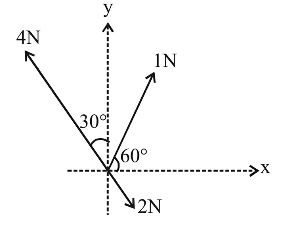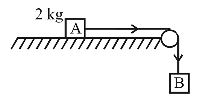Laws of Motion
- A person of mass 60 kg is inside a lift of mass 940 kg and presses the button on control panel. The lift starts moving upwards with an acceleration 1.0 m/s². If g = 10 ms–2, the tension in the supporting cable is
-
View Hint View Answer Discuss in Forum

Total mass = (60 + 940) kg = 1000 kg
Let T be the tension in the supporting cable, then
T – 1000g = 1000 × 1
⇒ T = 1000 × 11 = 11000 NCorrect Option: C

Total mass = (60 + 940) kg = 1000 kg
Let T be the tension in the supporting cable, then
T – 1000g = 1000 × 1
⇒ T = 1000 × 11 = 11000 N
-

Three forces acting on a body are shown in the figure. To have the resultant force only along the y- direction, the magnitude of the minimum additional force needed is:
-
View Hint View Answer Discuss in Forum
The components of 1 N and 2N forces along + x axis = 1 cos 60° + 2 sin 30°
= 1' 1 + 2' 1 = 1 + 1 = 3 =1.5 N 2 2 2 2 
The component of 4 N force along –x-axis = 4 sin 30°= 4 × 1 = 2N 2
Therefore, if a force of 0.5N is applied along + x-axis, the resultant force along x-axis will become zero and the resultant force will be obtained only along y-axis.Correct Option: A
The components of 1 N and 2N forces along + x axis = 1 cos 60° + 2 sin 30°
= 1' 1 + 2' 1 = 1 + 1 = 3 =1.5 N 2 2 2 2 
The component of 4 N force along –x-axis = 4 sin 30°= 4 × 1 = 2N 2
Therefore, if a force of 0.5N is applied along + x-axis, the resultant force along x-axis will become zero and the resultant force will be obtained only along y-axis.
- The mass of a lift is 2000 kg. When the tension in the supporting cable is 28000 N, then its acceleration is:
-
View Hint View Answer Discuss in Forum
Net force, F = T – mg
ma = T – mg
2000 a = 28000 – 20000 = 8000a = 8000 = 4ms-2 2000 Correct Option: A
Net force, F = T – mg
ma = T – mg
2000 a = 28000 – 20000 = 8000a = 8000 = 4ms-2 2000
- The coefficient of static friction, µs, between block A of mass 2 kg and the table as shown in the figure is 0.2. What would be the maximum mass value of block B so that the two blocks do not move? The string and the pulley are assumed to be smooth and massless.
(g = 10 m/s²) [2004]
-
View Hint View Answer Discuss in Forum
mBg = µs mAg {∵ mAg = µs mAg}
⇒ mB = µs mA
or, mB = 0.2 × 2 = 0.4 kgCorrect Option: A
mBg = µs mAg {∵ mAg = µs mAg}
⇒ mB = µs mA
or, mB = 0.2 × 2 = 0.4 kg

